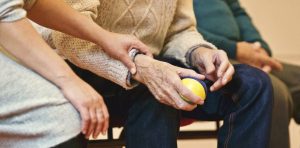
For those with elderly grandparents, parents, or other loved ones, knowing that they are receiving a high level of care can be a huge source of comfort. Whether this care is received in a nursing home, through a professional in-home care provider, or in another type of facility, there is a reasonable expectation that elderly loved ones will receive a high level of care and be treated with kindness and affection.
Unfortunately, this is not always the case. Around the world, one in six people age 60 and above experience some sort of abuse, according to the World Health Organization (WHO). If you are concerned about your elderly loved one, it’s important that you know how to recognize the signs of elder abuse as well as what to do if you suspect that abuse is occurring. We’ll cover these subjects in this blog post.
For legal help, please reach out to an elder abuse attorney at the Marc Brown Law Firm. Contact us.
Signs of Elder Abuse
Elder abuse can lead to long-term physical and psychological harm. When an elderly person is being abused or neglected by staff in a care facility or at-home care providers, they may display a range of behaviors and emotions that are not consistent with their usual personality. According to the National Institute on Aging, some of the most common signs of elder abuse or neglect that an elderly person may display include:
- A lack of sleep or disruption in normal sleep patterns
- Signs of confusion
- Seems depressed or less engaged than usual
- Displays signs of trauma, such as rocking back and forth
- Is suddenly aggressive, angry, or agitated—and may “act out”
- Does not want to eat or refuses food
- Is withdrawn, sullen, and quiet
- Seems afraid of the nursing home or of a particular care provider
- No longer wants to participate in social activities or other activities that they once enjoyed
Physical Signs to Look For
In addition to the above signs, there are also a number of physical signs of elder abuse or neglect that may signal that intervention is necessary. These might include:
- Unexplained, sudden weight loss or a rapid deterioration in condition that cannot be explained by medical facts alone
- Bruises, cuts, burns, or scars that are unexplainable
- Experiences accidents or injuries that cannot be explained, such as a bone fracture as a result of a slip and fall
- Develops bed sores or other preventable and adverse health conditions
- Has poor hygiene
Financial Abuse
While emotional and physical abuse are two of the most serious types of elder abuse, financial exploitation may also occur. Financial exploitation refers to a healthcare provider taking advantage of the elderly person for financial gain. Signs that financial abuse is occurring include:
- Large, inexplicable cash withdrawals
- Changes to a will, trust, or other estate-planning documents
- Missing personal items, such as jewelry
- New loans or lines of credit opened
What to Do if You Suspect Elder Abuse
Suspecting elder abuse is very serious. If you think that elder abuse is occurring, you should act immediately. The elderly person’s life and wellbeing could very much depend on the abuse being addressed and stopped. Here are some steps to take if you think that abuse is happening:
- Document the abuse. The very first thing that you should do is document any signs of suspected abuse. This might include writing down anything that the elderly person has told you, documenting bruises or other injuries, or jotting down notes about signs of a lack of hygiene, development of bed sores, etc. Make sure you update your notes frequently and, if you can, include pictures in your documentation.
- Ask the elderly person. Approaching your loved one to ask about the abuse can be difficult. An elderly person who is being abused may be confused, upset, embarrassed, or fearful about talking about the abuse. Depending on the person’s state of mind and health, they may not even be able to process that abuse is happening or communicate instances of abuse to you. However, your loved one may open up to you about what’s going on if they are comfortable and able to.
- Talk to nursing home supervisors. If you suspect abuse, you should bring your concerns to nursing home supervisors or the nursing home manager immediately. If no action is taken, follow up.
- Call the South Carolina Department of Social Services. You should report all allegations of suspected nursing home/elderly person abuse to the South Carolina Department of Social Services (DSS). For reporting abuse in Sumter, call the abuse and neglect hotline at (803) 775-2273. For reporting abuse in Columbia, call the abuse and neglect hotline at (803) 714-7444. You can also email the DDS or visit an office in person.
- Contact an attorney. If abuse or neglect is occurring and the elderly person has suffered harm as a result, you may have a cause of action to bring forth a civil claim against the nursing home or the responsible care provider. A knowledgeable elder abuse attorney can help you understand your options and serve as your representative in negotiations or trial. Civil action can be sought for monetary damages to compensate economic and noneconomic damages suffered as a result of the abuse. A civil action can also be a deterrent, helping to protect other elderly people in the future. Filing a civil suit can also provide a sense of justice for the elderly person and their family.
Get Legal Help Today
Elder abuse is completely inappropriate and unacceptable. By knowing the signs of abuse and what to do if abuse is suspected, you can help to keep your loved ones safe. If you need legal counsel in bringing forth an elder abuse claim, reach out to attorney Marc Brown today.